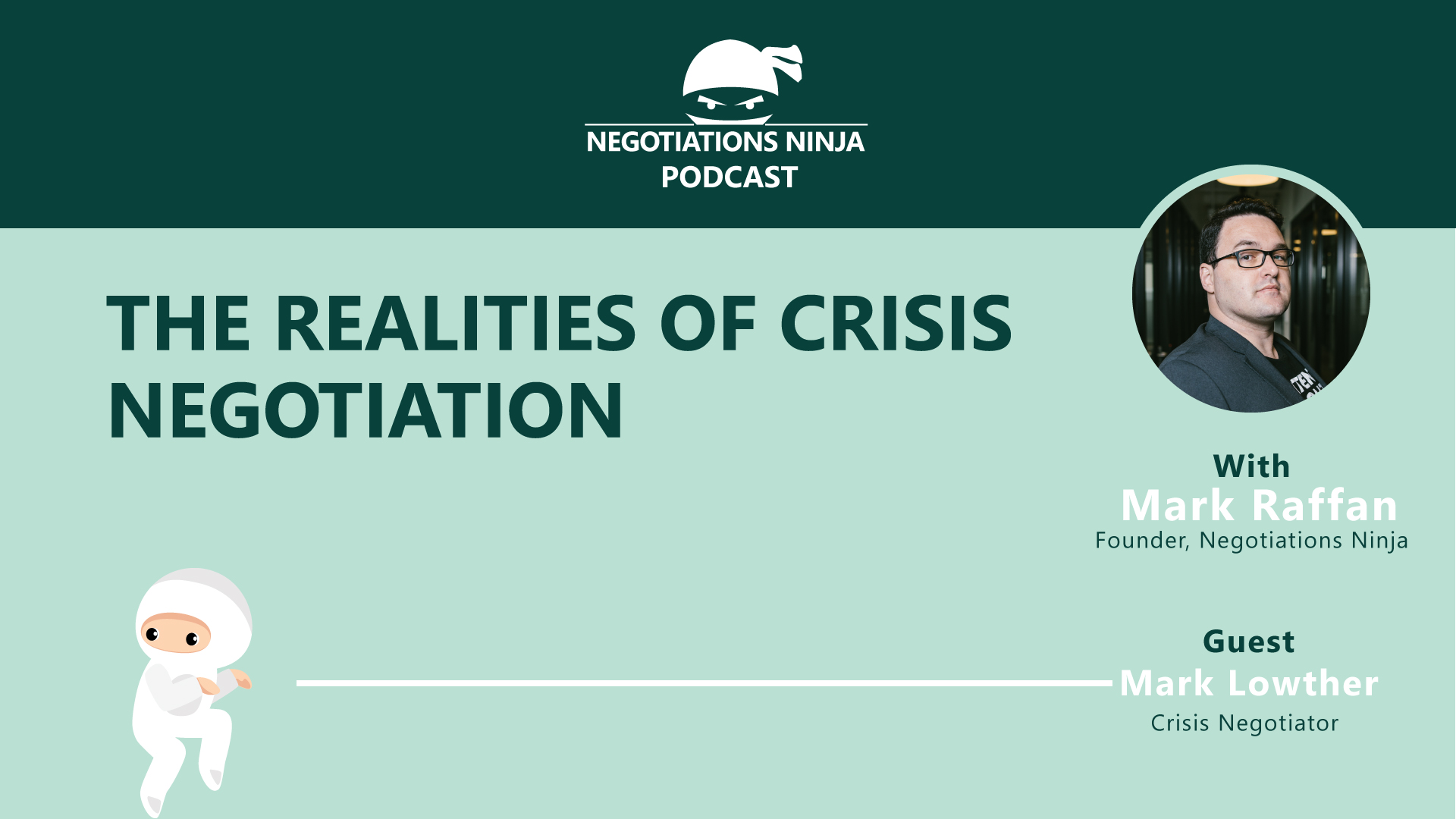Nobody would assume that crisis negotiation is easy, but few of us truly know just how hard it is. My guest on this episode, Mark Lowther, is one of those who know the reality first-hand. Mark’s diverse catalog of experiences ranges from serving in the United States Marines to two Metro SWAT teams where he was involved in and all levels of negotiations, including the first known hostage negotiations involving social media.
Mark has extensive background and training in suicide intervention and on this episode, you’ll hear him describe the most difficult and disappointing negotiation of his career which involved a young woman who was committed to taking her own life. Join us for this conversation to see the true face of crisis negotiation.
Outline of This Episode
- [3:12] Mark’s experience in hostage and crisis negotiation throughout the U.S. and worldwide
- [3:45] The best negotiation of Mark’s illustrious career
- [12:20] The reasons and roles of a variety of diverse team members
- [14:45] The worst negotiations of Mark’s career (a suicide and a
- [22:15] The difficulty of losing a victim in a crisis situation and what we can learn
- [25:36] Knowing your team is vital for success and support
Mark had a 100% success rate with those threatening suicide
When Mark was called to the scene where a woman sitting in her car was reported to be considering suicide he felt ready for the challenge. He’d faced many suicide negotiations in the past and in every case he’d been able to provide a way out for the person in question and convince them to take it. Upon his arrival, the woman got out of the car with a gun in her hand. Because of the potential threat to himself and his team, Mark spoke with the woman from a squatting position behind a police car.
When he spoke to her, she would stand very still, listen, and look directly at him. But when he paused or took a break to allow her time to think, she’d become agitated, begin pacing, and would alternately move the gun from her head to her chest and back again. Mark tried to keep talking so the woman would remain calm. This went on for over two hours until the woman looked him in the eye, put the gun to her head, and pulled the trigger.
The difficult lessons of a failed crisis negotiation
For months after the loss of the woman, Mark analyzed the situation. He watched police dashcam tapes, he recounted the conversation over and over in his mind, and he tried to find clues as to what he said or did that caused the woman to take her life. He says if it wasn’t for the support of his colleagues and co-workers he might never have come to the realization that the woman’s death was not his responsibility — it was hers.
Nobody wants to participate in the events the lead up to the death of another person, especially in a situation as difficult and heartbreaking as suicide. But in the end, no matter what is said or done, the person who takes their own life made the decision, nobody else did. Mark had to struggle to come to that conclusion, which was probably a natural process he had to go through. But he wants you to know the truth about those types of situations before you encounter them yourself. Knowing ahead of time that another person’s suicide is not your fault could help you move through the loss more quickly.
The best results of a crisis negotiation flow from teamwork and great communication
Mark also described one of the most successful crisis negotiation situations he had the privilege to work on and was asked what made it so successful. He says that the best negotiations are a result of everyone involved working as a team. There can be no superstars or people who are seeking the limelight. It’s an all-in situation for everyone on the team. Their mindset must be that they either succeed together or fail together.
When the team is able to come together like this — for the sake of reaching a good outcome together — the results can be almost magical. In addition, the moral support each team member receives is unparalleled. Discouragements and difficulties will undoubtedly happen in the process of any negotiation, but a committed and cohesive team will carry everyone through them.
A diverse team = a great negotiation team
One of the main points Mark makes in this conversation is that the most successful negotiation teams he’s been privileged to be a part of are those that are quite diverse. Life experience colors the way a negotiator approaches each situation and the more varied the life experiences of the negotiators on the team, the more situations they’ll encounter where genuine empathy can be expressed. As an example, Mark says his best teams were comprised of religious and non-religious people, male and female, straight and gay individuals, and all ethnicities.
Mark also points out that the more relational the team members are with each other, the more fluid and natural their interactions become. So he encourages negotiators and their support staff to share life situations and become an everyday support system for each other. Not only is it beneficial in the short-term as personal needs and situations are carried together it’s also building the relationships upon which successful teamwork will happen in the crisis moments they will face.
Resources & People Mentioned
Get a Free Ticket to the Spark Event in February at:
Website: ScoutRFP
Ticket Code: ninja2020
Connect with Mark Lowther
- www.Negotiator911.com – Mark’s website
- Mark’s previous episode on Negotiations Ninja
- Mark on LinkedIn
- Follow Mark on Twitter: @MarkLowther66
Connect With Mark
- Follow Negotiations Ninja on Twitter: @NegotiationPod
- Connect with Mark on LinkedIn
- Follow Negotiations Ninja on LinkedIn
- Connect on Instagram: @NegotiationPod




